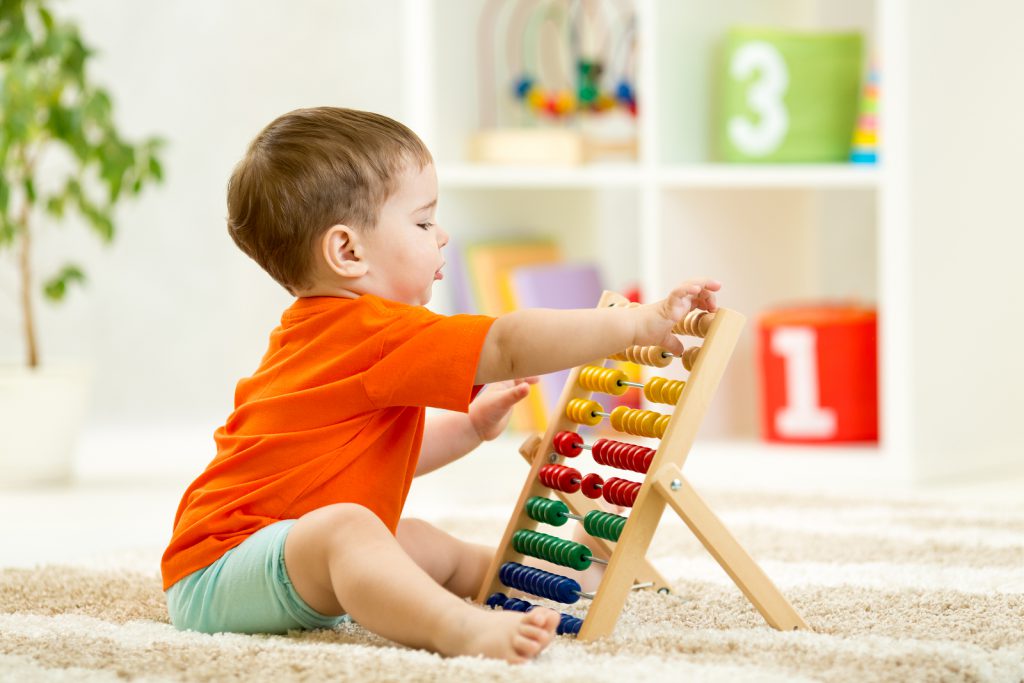Your Child Can Learn Life Skills Through Games
While we all like playing games, children are especially drawn to games and game-like activities. This makes games the perfect vessel for children to learn life skills.
Specially designed "learning games" are some of the most efficient learning tools you can find. Utilizing such games with your children, will help them acquire valuable skills that will serve them immensely later in life.
As a parent, you have an active role in your child’s play. Children love having their parents as playmates and tend to be more creative when the parent is involved. So instead of just watching your child play or providing the toys, join the game!
 Motor skills are vital for gross and fine motor development, and proper movement coordination. Gross motor skills are promoted by crawling, running, jumping, climbing or kicking a ball. Fine motor skills are developed as children handle small toys.
Executive functioning and self-regulation skills include critical thinking, cause-effect association, deduction, imagination, problem solving and creativity. These skills are necessary for planning, attention focus, remembering instructions, multitasking, emotional control, prioritization and flexible thinking. Games that enhance these skills can range from imaginary play and imitation to complex board games.
Social skills refer to the child’s ability to interact with others, verbally and non-verbally. Games can teach children valuable social skills such as abiding by the rules, waiting their turn, negotiation, cooperation and sharing. This later translates into balanced social interactions with peers and lasting friendships.
Emotional skills help children manage, appropriately express and control their emotional state. Activities focusing on social and emotional skills include dealing with hypothetical situations and role switching games.
Speech and language skills. According to experts, the first 3 years of life are crucial for acquiring speech and language skills. This is the period when the brain develops and matures, and is hence most able to absorb languages. These skills develop best in an environment abounding with sounds, sights and exposure to speech and language input.
Activities that promote these skills include: active verbal interaction, repeating the names of favorite toys, songs, melodic nursery rhymes and computer games.
Listening skills include the ability of the child to hear and distinguish sounds, determine the direction of sound and the ability of voice intonation and sense for rhythmic patterns.
These skills can be perfected by playing games where the child identifies animal or environmental sounds, noise guessing games, story CDs and so on.
What follows are some examples of games and playtime activities that are both enjoyable and beneficial. The basic principle remains the same – learning something while having fun.
Motor skills are vital for gross and fine motor development, and proper movement coordination. Gross motor skills are promoted by crawling, running, jumping, climbing or kicking a ball. Fine motor skills are developed as children handle small toys.
Executive functioning and self-regulation skills include critical thinking, cause-effect association, deduction, imagination, problem solving and creativity. These skills are necessary for planning, attention focus, remembering instructions, multitasking, emotional control, prioritization and flexible thinking. Games that enhance these skills can range from imaginary play and imitation to complex board games.
Social skills refer to the child’s ability to interact with others, verbally and non-verbally. Games can teach children valuable social skills such as abiding by the rules, waiting their turn, negotiation, cooperation and sharing. This later translates into balanced social interactions with peers and lasting friendships.
Emotional skills help children manage, appropriately express and control their emotional state. Activities focusing on social and emotional skills include dealing with hypothetical situations and role switching games.
Speech and language skills. According to experts, the first 3 years of life are crucial for acquiring speech and language skills. This is the period when the brain develops and matures, and is hence most able to absorb languages. These skills develop best in an environment abounding with sounds, sights and exposure to speech and language input.
Activities that promote these skills include: active verbal interaction, repeating the names of favorite toys, songs, melodic nursery rhymes and computer games.
Listening skills include the ability of the child to hear and distinguish sounds, determine the direction of sound and the ability of voice intonation and sense for rhythmic patterns.
These skills can be perfected by playing games where the child identifies animal or environmental sounds, noise guessing games, story CDs and so on.
What follows are some examples of games and playtime activities that are both enjoyable and beneficial. The basic principle remains the same – learning something while having fun.
 Some keyboarding games focus on typing speed. The child presses letters on the keyboard matching the ones on the screen. The goal is to correctly type in as many letters as possible within a limited time frame.
There are also keyboarding games which can serve as educational tools for younger children. The child is asked to recognize letters on a keyboard and use the correct hand to press the key. This way, the child can learn both letter recognition and keyboarding.
Some keyboarding games focus on typing speed. The child presses letters on the keyboard matching the ones on the screen. The goal is to correctly type in as many letters as possible within a limited time frame.
There are also keyboarding games which can serve as educational tools for younger children. The child is asked to recognize letters on a keyboard and use the correct hand to press the key. This way, the child can learn both letter recognition and keyboarding.
 With the abundance of games and playtime activities out there, it can be difficult to determine which approach is best for your child. Our online learning resources are specifically designed to help your child learn, practices, and achieve amazing results at school.
With the abundance of games and playtime activities out there, it can be difficult to determine which approach is best for your child. Our online learning resources are specifically designed to help your child learn, practices, and achieve amazing results at school.
How can games help your child learn life skills?
The concept of play as a form of learning and development is widely used today. Games and other forms of play have proven to be valuable educational instruments and add-ons to traditional ways of teaching. Through play, children explore the world around them and discover their abilities. Games also stimulate thought processing and deduction which serve as the foundation of intellectual development.What skills can be developed through games?
Games can help children develop a sense of security, independence, self-control, cooperation and confidence. These skills will strengthen as your child explores, solves problems, interacts with other children and accomplishes goals through play. Games also facilitate the development of children’s motor, emotional, cognitive, social, executive functional, listening and language skills. Motor skills are vital for gross and fine motor development, and proper movement coordination. Gross motor skills are promoted by crawling, running, jumping, climbing or kicking a ball. Fine motor skills are developed as children handle small toys.
Executive functioning and self-regulation skills include critical thinking, cause-effect association, deduction, imagination, problem solving and creativity. These skills are necessary for planning, attention focus, remembering instructions, multitasking, emotional control, prioritization and flexible thinking. Games that enhance these skills can range from imaginary play and imitation to complex board games.
Social skills refer to the child’s ability to interact with others, verbally and non-verbally. Games can teach children valuable social skills such as abiding by the rules, waiting their turn, negotiation, cooperation and sharing. This later translates into balanced social interactions with peers and lasting friendships.
Emotional skills help children manage, appropriately express and control their emotional state. Activities focusing on social and emotional skills include dealing with hypothetical situations and role switching games.
Speech and language skills. According to experts, the first 3 years of life are crucial for acquiring speech and language skills. This is the period when the brain develops and matures, and is hence most able to absorb languages. These skills develop best in an environment abounding with sounds, sights and exposure to speech and language input.
Activities that promote these skills include: active verbal interaction, repeating the names of favorite toys, songs, melodic nursery rhymes and computer games.
Listening skills include the ability of the child to hear and distinguish sounds, determine the direction of sound and the ability of voice intonation and sense for rhythmic patterns.
These skills can be perfected by playing games where the child identifies animal or environmental sounds, noise guessing games, story CDs and so on.
What follows are some examples of games and playtime activities that are both enjoyable and beneficial. The basic principle remains the same – learning something while having fun.
Motor skills are vital for gross and fine motor development, and proper movement coordination. Gross motor skills are promoted by crawling, running, jumping, climbing or kicking a ball. Fine motor skills are developed as children handle small toys.
Executive functioning and self-regulation skills include critical thinking, cause-effect association, deduction, imagination, problem solving and creativity. These skills are necessary for planning, attention focus, remembering instructions, multitasking, emotional control, prioritization and flexible thinking. Games that enhance these skills can range from imaginary play and imitation to complex board games.
Social skills refer to the child’s ability to interact with others, verbally and non-verbally. Games can teach children valuable social skills such as abiding by the rules, waiting their turn, negotiation, cooperation and sharing. This later translates into balanced social interactions with peers and lasting friendships.
Emotional skills help children manage, appropriately express and control their emotional state. Activities focusing on social and emotional skills include dealing with hypothetical situations and role switching games.
Speech and language skills. According to experts, the first 3 years of life are crucial for acquiring speech and language skills. This is the period when the brain develops and matures, and is hence most able to absorb languages. These skills develop best in an environment abounding with sounds, sights and exposure to speech and language input.
Activities that promote these skills include: active verbal interaction, repeating the names of favorite toys, songs, melodic nursery rhymes and computer games.
Listening skills include the ability of the child to hear and distinguish sounds, determine the direction of sound and the ability of voice intonation and sense for rhythmic patterns.
These skills can be perfected by playing games where the child identifies animal or environmental sounds, noise guessing games, story CDs and so on.
What follows are some examples of games and playtime activities that are both enjoyable and beneficial. The basic principle remains the same – learning something while having fun.
Keyboarding games
Keyboarding skills are essential for the academic success of your child. Online typing games and lessons focus on teaching children how to develop proper touch typing skills. Touch typing involves the use of a keyboard through muscle memory, without relying on the sense of sight to locate the keys. There are also typing speed tests to determine speed and accuracy. Keyboarding games are usually designed as sets of touch typing exercises, starting with a few keys and gradually increasing the number of keys and level of difficulty. These exercises focus on proper finger placement and teach the child how to improve the finger movements. Some keyboarding games focus on typing speed. The child presses letters on the keyboard matching the ones on the screen. The goal is to correctly type in as many letters as possible within a limited time frame.
There are also keyboarding games which can serve as educational tools for younger children. The child is asked to recognize letters on a keyboard and use the correct hand to press the key. This way, the child can learn both letter recognition and keyboarding.
Some keyboarding games focus on typing speed. The child presses letters on the keyboard matching the ones on the screen. The goal is to correctly type in as many letters as possible within a limited time frame.
There are also keyboarding games which can serve as educational tools for younger children. The child is asked to recognize letters on a keyboard and use the correct hand to press the key. This way, the child can learn both letter recognition and keyboarding.
Games for language skills
These games can range from simple verbal interaction to computer games. They don’t have to be done in a structured environment - you can train your child’s language skills while in a car or at the park. Such games also promote social skills like waiting for their turn, observing, listening and having a good attention span. Communication in other languages is also helpful. Bilingual children often have better executive function skills than monolingual children, hence the ability to use an additional language is also an important skill. Computer or console games are an efficient language enhancing tool. These games can also strengthen the ability of the child to structure sentences and grasp the subtleties of the language used in the game. Pretend play games, where the child engages in imaginary conversations with dolls or superhero figures, are also a great way to boost language skills.Games for executive functioning skills
These vital skills can be greatly amplified through interaction and practice. They help children discover the possibilities that exist in the outside world, develop cognitive concepts, solve problems, enhance memory capacity and attention span. Intentional imaginary play and imitation are effective ways to train these skills. During the game, children develop rules which guide their actions. They also develop complex ideas and shape their actions to follow these rules, while suppressing impulses that are not appropriate for the assumed role. Board games are an excellent cognitive enhancer and brain booster. They also bring the entire family together, for added benefit and fun. Board games enhance children’s decision making skills (having to choose between two actions), consequences (results of their previous choices) and strategic thinking (the advantage of choosing a certain action to accomplish a goal). You can set aside a specific time for your board games, thus creating a family ritual and a sense of pleasant routine, which is very important for children. With the abundance of games and playtime activities out there, it can be difficult to determine which approach is best for your child. Our online learning resources are specifically designed to help your child learn, practices, and achieve amazing results at school.
With the abundance of games and playtime activities out there, it can be difficult to determine which approach is best for your child. Our online learning resources are specifically designed to help your child learn, practices, and achieve amazing results at school.